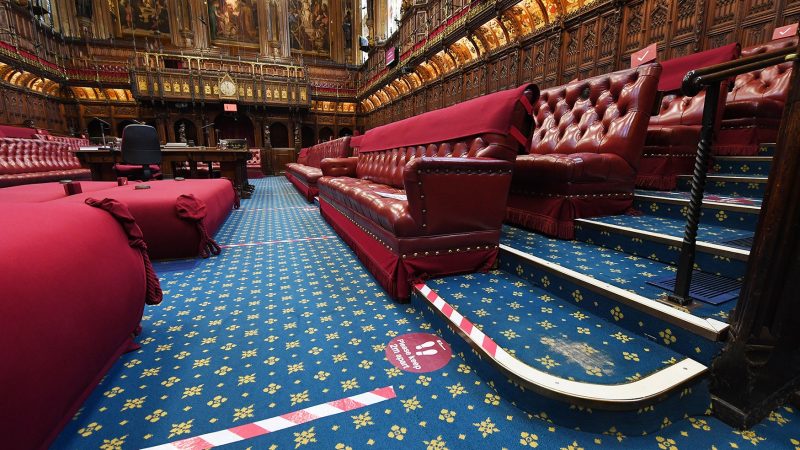
18 Labour peers have defied the whip to vote in favour of reinserting an amendment that would specifically ban the authorisation of rape, torture and murder by public bodies under the so-called ‘spycops’ bill.
The House of Lords this afternoon considered MP amendments to the covert human intelligence sources (criminal conduct) bill, which allows certain public bodies to authorise criminal conduct by sources known as ‘CHIS’.
The cross-party joint committee on human rights has expressed its view that the bill “raises the abhorrent possibility of serious crimes such as rape, murder or torture being carried out under an authorisation”.
Former shadow attorney general Shami Chakrabarti moved that the amendment banning the most serious criminal conduct – rejected by MPs last month – be reinserted into the legislation. Peers voted down the proposal by 311 to 143.
The original amendment gained cross-party support last month, as the Lords voted by 299 to 284 to bar actions that intentionally cause death or grievous bodily harm, pervert the course of justice or include rape and sexual offences or torture.
MPs then rejected the amendment after the solicitor general argued that banning certain crimes within the bill would risk the safety of confidential informants. It was also argued that the bill complies with the Human Rights Act.
The Human Rights Act 1998 incorporated into domestic law the European Convention on Human Rights, which consists of numbered articles protecting basic human rights, including the prohibition of torture for example.
Chakrabarti argued today: “The government’s rebuttal is, I’m afraid, both circular and hollow. It argues that the grave offences in this amendment would provide a deadly checklist against which suspected undercover agents might be tested.
“But it also argues that the Convention rights already provide these express prohibitions. My Lords, this amendment might either be dangerous or superfluous, but it surely cannot be both. So, which is it?”
The Labour peers were told to abstain. But 17 broke the whip to join Chakrabarti and vote in favour of it, including Andrew Adonis, a Blairite ex-minister, and Stewart Wood, a former adviser to Gordon Brown and Ed Miliband.
Adonis told the Lords: “The only reason we’re not putting it into this bill is to create and to equivocate on whether murder, rape and torture are indeed against the European Convention on Human Rights and the Human Rights Act.”
The former minister under the Tony Blair and Gordon Brown Labour administrations added: “My Lords, we’re not talking about a shopping list here. We’re talking about specific exceptions for the most heinous crimes.”
CHIS would allow public bodies, ranging from MI5 to the Food Standards Agency, to authorise agents to commit crimes while undercover. The Labour frontbench has said voting it down would “weaken national security and human rights”.
Chakrabarti had previously tabled two amendments to the government legislation on covert human intelligence sources earlier this year, which she said aimed to remove “total criminal and civil immunity” proposed for undercover agents.
She told LabourList last year: “You do not protect law and order by allowing armies of members of the community, including former criminals who are turned, or continuing criminals who are also operating as CHIS, to break the law with impunity.”
She argued at the time that she was “hoping” to work with the Labour leadership on the bill, particularly after the government conceded that “this isn’t just putting the existing, difficult, shadowy, vital practice on a statutory footing”, in her words.
But the Labour leadership instructed its peers to vote against the amendments she tabled in January. Labour sources, according to The Guardian, “complained that Chakrabarti was trying to inflame internal divisions”.
One source reportedly said there had been “no real attempt” to engage with the leadership on the issue. Chakrabarti told those briefing against her to journalists amid internal party divisions over the ‘spycops’ bill to “grow up”.
34 Labour MPs defied the whip on the government-proposed legislation, and seven frontbenchers including shadow ministers Dan Carden and Margaret Greenwood quit, to vote against it at its third reading in the Commons last year.
Correction: This article previously stated that Labour peers were whipped to vote against the amendment, when they were in fact whipped to abstain.
Below is the full list of Labour peers who voted for Chakrabarti’s amendment.
Lord Adonis (Labour – Life peer)
Baroness Blower (Labour – Life peer)
Baroness Bryan of Partick (Labour – Life peer)
Baroness Chakrabarti (Labour – Life peer)
Baroness Clark of Kilwinning (Labour – Life peer)
Lord Davies of Brixton (Labour – Life peer)
Lord Filkin (Labour – Life peer)
Lord Hendy (Labour – Life peer)
Lord Jordan (Labour – Life peer)
Lord Judd (Labour – Life peer)
Lord MacKenzie of Culkein (Labour – Life peer)
Baroness Osamor (Labour – Life peer)
Lord Sikka (Labour – Life peer)
Viscount Simon (Labour – Excepted Hereditary)
Baroness Whitaker (Labour – Life peer)
Lord Whitty (Labour – Life peer)
Lord Wood of Anfield (Labour – Life peer)
Lord Woodley (Labour – Life peer)




More from LabourList
Nudification apps facilitate digital sexual assault – and they should be banned
Diane Abbott suspended from Labour after defending racism comments
Labour campaign groups join forces to call for reinstatement of MPs